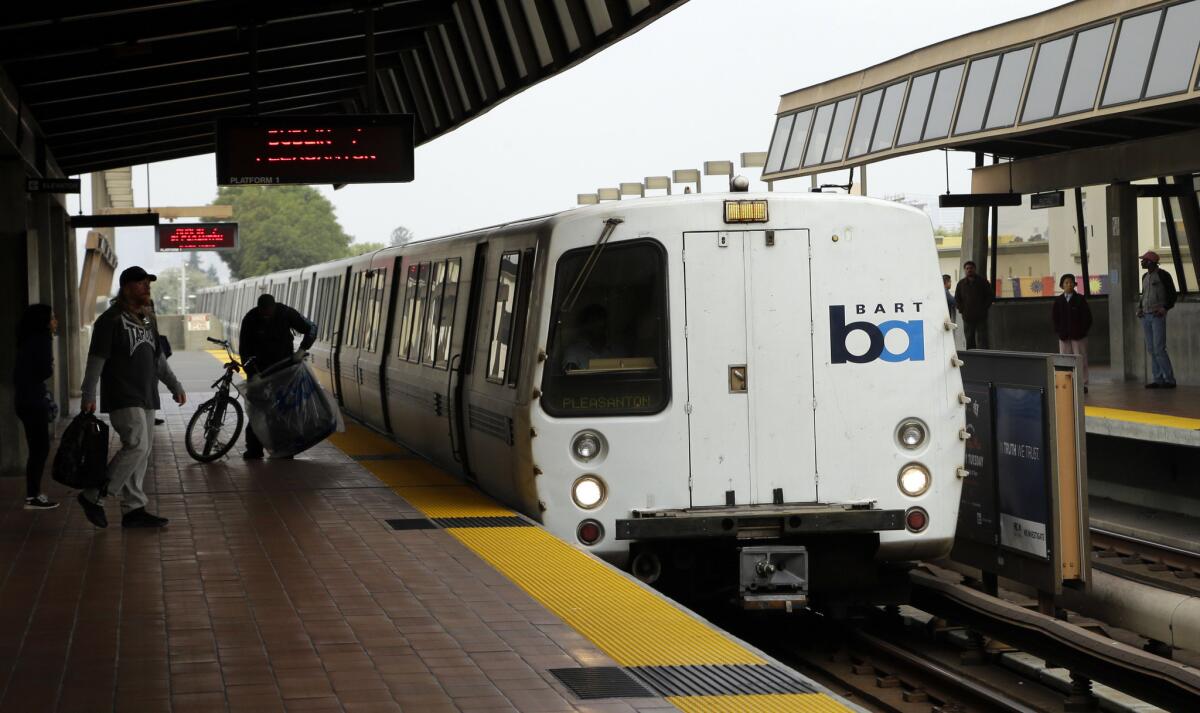BART strike possible Tuesday as talks continue

OAKLAND — The San Francisco Bay Area braced for a potential regional transit strike as the clock ticked toward an 11:59 p.m. cutoff of negotiations that have dragged on since April.
After a late Sunday impasse, both sides reported for talks Monday at Caltrans’ Oakland headquarters, with unions vowing a strike beginning Tuesday if resolution does not come by 11:59 p.m.
Neither side would reveal the nature of those discussions.
In a statement, Bay Area Rapid Transit management said, “The mediator has asked that we not discuss specifics of the conversation. BART is willing to continue the conversations for as long as necessary to reach a negotiated settlement to keep the trains running.”
About 200,000 round-trip commuters rely on the 104-mile system, making 400,000 trips per day. The strike would be the second since a 4 1/2-day shutdown brought BART to a halt in July. Numerous strike deadlines have since passed, with Gov. Jerry Brown intervening in August to impose a 60-day cooling-off period.
Negotiations heated up again last week, with what many elected leaders and labor observers took to be promising progress over the weekend.
Service Employees International Union Local 1021 and Amalgamated Transit Union Local 1555 together represent 2,375 mechanics, custodians, station agents, clerical workers and train operators.
Early in the summer, they had sought raises of over 20% over three years, with BART management offering 8% over four years. Management also sought pension contributions from employees, who currently make none, and an increase in healthcare contributions. (BART employees now pay a flat rate of $92 per month.)
While a mediator-imposed gag order kept many details of the marathon weekend negotiations largely out of public view, that changed Sunday night when talks stalled.
BART General Manager Grace Crunican said management had delivered its “last best and final” offer at 4 p.m. Sunday -- of a 12% raise over four years. A chart released by management showed that workers would pay 1% toward pensions the first year, and an additional percentage point each year, resulting in a 4% contribution the fourth year of the contract.
Health benefit contributions would also scale up, from a $132 flat rate the first year to $144 in the fourth year of the contribution. If ridership increases beyond forecast levels, each employee could receive up to a $1,000 bonus each year, the chart shows.
Crunican had rejected late-night pleas by state lawmakers that BART withdraw that offer and continue negotiating. Instead, she pressed the unions to put the deal to a vote of their members.
A “last best and final offer” potentially allows BART to declare an impasse in the talks and impose a contract.
Union representatives, meanwhile, called the offer “regressive” and said it had derailed meaningful progress.
The sticking points remained somewhat unclear Monday.
While pay, pensions and health benefit contributions have been the most difficult negotiation issues over the past month, SEIU Local 1021 President Pete Castelli said in a statement late Monday that his union had made “real progress” on the economic issues but was struggling to come to agreement on safety issues and other work rules.
Management has previously called those “smokescreen” diversions.
Commuters, meanwhile, expressed their frustrations. A regional business group determined that July’s strike caused a $73-million blow to the Bay Area economy, and recent polls have shown commuter patience with BART workers -- who are relatively well-paid -- to be waning.
Writing on Twitter, @MrSilverKing had this to say: “#DearBART stop your extortion of the system. No one can sympathize with you. Selfish and greedy. Hire new employees.”
ALSO:
Man accused of aiding Al Qaeda was headed to Syria, feds sayMan recalls eating squirrels to survive alone in California forest
Sister recalls horrible scene as teacher is slain at Long Beach park
Twitter @leeromney
[email protected]
More to Read
Sign up for Essential California
The most important California stories and recommendations in your inbox every morning.
You may occasionally receive promotional content from the Los Angeles Times.











